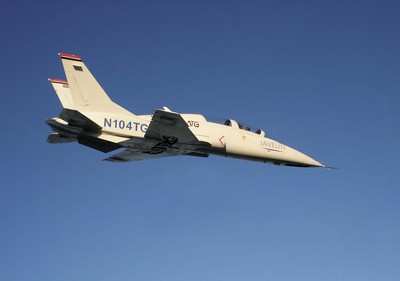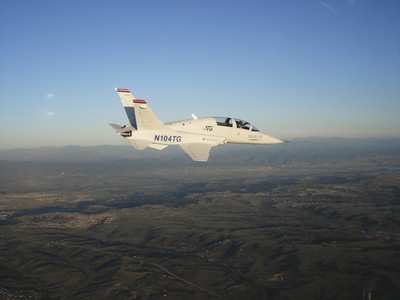Mon, Jan 15, 2007
Engine Placement Stymies Current Regulations
The FAA has proposed a set of special conditions the Aviation
Technology Group's upcoming Javelin 100 will have to meet prior to
the issuance of a Type Certification, due to the placement of the
aircraft's twin turbofan engines.

The reason? The FAA says current airworthiness regulations for
Part 23 aircraft do not contain adequate safety standards for the
side-by-side placement of the $2.795 million jet's Williams
engines, inside the aft fuselage like an F-15. Current regs assume
the engines are separated from each other on mounting attachments
to the fuselage or wing.
The agency is concerned with the possibility a fire in one
engine could spread to the other... as well as to a 280 gallon fuel
tank located forward of the engines, behind the cockpit. Critical
control linkages and the plane's horizontal and vertical
stabilizers are also nearby.
Current regulations also assume the engines will be in the
pilots' field of vision, and a fire in one would not prevent the
plane's pilot(s) from executing an emergency landing inside 15
minutes, before the flames break through the firewall. The FAA
questions whether that same margin of safety would apply to the
Javelin.

"Part 23 historically addressed fire protection on multiengine
airplanes based on the assumption that the engines are sufficiently
separated to essentially eliminate the possibility of an engine
fire spreading to another engine..." the FAA writes in its request
for comments on the proposed guidelines. "Title 14 CFR, part 23,
did not envision the type of configuration of the Javelin Model 100
airplane."
To overcome the possibility of an engine fire spreading in a
Javelin, the FAA proposes a "two-shot" fire extinguishing system,
that would include features to isolate each fire zone from any
other zone -- and the airplane -- to maintain isolation of the
engines during a fire.
The comment period for the proposed special guidelines runs
through February 7.
More News
Pilot Also Reported That Due To A Fuel Leak, The Auxiliary Fuel Tanks Were Not Used On June 4, 2025, at 13:41 eastern daylight time, a Piper PA-23, N2109P, was substantially damage>[...]
Have A Story That NEEDS To Be Featured On Aero-News? Here’s How To Submit A Story To Our Team Some of the greatest new stories ANN has ever covered have been submitted by our>[...]
From 2023 (YouTube Edition): Reflections on War’s Collective Lessons and Cyclical Nature The exigencies of war ought be colorblind. Inane social-constructs the likes of racis>[...]
Aero Linx: Colorado Pilots Association (CPA) Colorado Pilots Association was incorporated as a Colorado Nonprofit Corporation in 1972. It is a statewide organization with over 700 >[...]
High Speed Taxiway A long radius taxiway designed and provided with lighting or marking to define the path of aircraft, traveling at high speed (up to 60 knots), from the runway ce>[...]
 NTSB Prelim: Piper PA-23
NTSB Prelim: Piper PA-23 ANN FAQ: Submit a News Story!
ANN FAQ: Submit a News Story! Classic Aero-TV: One Mans Vietnam
Classic Aero-TV: One Mans Vietnam ANN's Daily Aero-Linx (07.03.25)
ANN's Daily Aero-Linx (07.03.25) ANN's Daily Aero-Term (07.03.25): High Speed Taxiway
ANN's Daily Aero-Term (07.03.25): High Speed Taxiway




